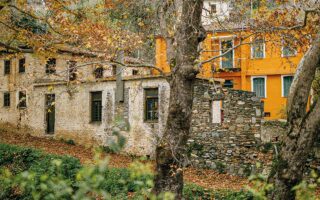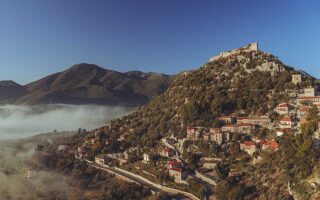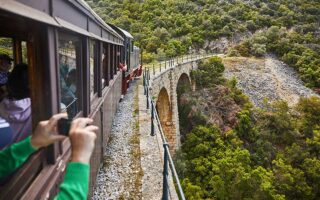For regular outdoor enthusiasts and connoisseurs of Greece’s hiking trails who understand the demands of hiking, the recent disappearances of tourists on the Greek islands, and the deaths of five visitors since the beginning of June, are not just an unusual phenomenon which characterizes this summer. Despite the – indeed, unprecedented – number of deaths in a short period of time, tourists lose their lives every year doing seemingly simple outdoor activities.
“We do not have knowledge of the particular circumstances for each of the incidents to draw a general conclusion,” the editor of hiking magazine Anevenontas (Climbing) and experienced hiker and mountaineer Miltos Zervas tells Kathimerini. He observes, however, that all the deaths happened on islands, where in recent years there has been an emphasis on hiking activities, without, however, correspondingly sufficient information about the possible risks.
“Recently, on many islands, such as Sifnos, Kythera, Karpathos, and Crete, networks of trails have been developed, not because there are necessarily hikers there, but to extend the tourist season. However, we are probably inviting people to walk on trails without first informing them of the difficulties they will encounter or warning them to avoid them in the summer months,” he says. “Last year and the year before, tourists died on the E4 hiking trail in southern Crete, which I have also walked, and I am trained and know the terrain. And while I went at the beginning of May with a friend of mine, we found ourselves wondering, ‘How are we going to climb this hill in the heat?’ The heat exhausts you without realizing it. And at some point you reach a dead end, in terms of fitness.”
It is no coincidence that these incidents concern exclusively foreign visitors. “Locals will not go anywhere in the middle of the day. Between 2 and 5 p.m. there’s not a soul outside,” says Zervas. “Humans have developed a code of behavior in relation to their natural environment that a visitor can defy if it’s not pointed out to them. Anyone can trip up very easily.”
“Hiking in the summer on an island, where you are exposed to the sun, has certain requirements,” Lefteris Trikiriotis, a mountain guide and member of the Northern Aegean Region’s trails committee, tells Kathimerini. “Proper shoes, proper nutrition, stay hydrated, carry electrolytes especially if you are of a certain age, inform the hotel, have the GPS on. Since we cannot expect our visitors to be conscious hikers, we need to acquire a communication strategy. To have, for example, information points on all the islands, for any activity.”
Responsibility lies both with the visitor and the destination, says Trikiriotis. “In Greece we still sell ‘sea, sex & sun,’ but walking on the beach is one thing, outdoor activity is another. Greece is basically a mountainous country, with a large proportion of mountainous relief. But we don’t tell foreigners this and they think the islands are playgrounds,” he explains. “The islands, however, are mountains. They may not have an altitude but we have difficult terrains and in the summer we have weather conditions that cause excess fatigue. Whoever starts an activity with incomplete information has committed the first big mistake.”
Among the good practices that must precede any hike is a briefing by the local mountaineering/hiking club or another relevant professional – certainly not “from the lady who rents him a room on her roof.”
“Accommodation owners should not be giving such information. Everyone provides information about everything without realizing their responsibility. In a country where many of us work in tourism, our tourism education is zero,” Trikiriotis says.
‘Greece is basically a mountainous country… But we don’t tell foreigners this and they think the islands are playgrounds,’ says mountain guide Lefteris Trikiotis
The welcoming Greek summer seems to hide unexpected pitfalls. Those in the know insist that Greece is not lacking experienced professionals, but a central information strategy from the state. At the same time, experienced hikers with whom Kathimerini spoke note that local hiking networks are well developed. But the average visitor does not necessarily have an understanding of hiking – nor is he required to have one. “If they don’t have somewhere to turn, if they’re told, ‘You’re a beginner, you can only walk during these hours, and out of the 15 available routes you can only do two or you’ll need to take a local guide with you,’ people will keep rolling the dice. And the more dice we roll, the likelier we are to have more accidents,” Trikiriotis adds.
‘Extreme heat’
Hellenic Police (ELAS) spokesperson Konstantia Dimoglidou says that the aggravating factor in the disappearances of tourists that had a tragic ending at the beginning of June was the extreme and unprecedented heat that affected the country.
“The police officers who participated in the search operation for Michael Mosley in Symi had the feeling that the soles of their feet were burning,” she tells Kathimerini, referring to the popular British TV presenter and author who was found dead on the Greek island on June 9, after a days-long search. “They described to us an extreme heat that makes hiking impossible. Especially on these rocky, bare landscapes, the situation becomes unbearable,” she says, adding that the number of disappearances of foreign tourists has increased in recent years.
Dimoglidou adds that apart from the extreme heat, these tragic events are due to a combination of factors. “Most of the missing were over 60 years old. Hikers often embark on difficult climbs with minimal equipment, some without a mobile phone or sufficient water. Also, most of the time they hike without a guide,” she explains. In fact, their love for exploration leads many of them to step off the mapped paths, which apparently happened to the experienced hiker in Amorgos.
“We often find that they overestimate their strength or underestimate the risks. Mountaineering and hiking are a staple in the culture of many Europeans, but our landscape is not the same as the one they may have practiced on.”
For his part, the mayor of West Samos, Themistoklis Papatheofanous, says that “the Dutchman who lost his life on our island went hiking at noon, a completely inappropriate time. He entered a ravine which is very difficult to climb out of.”
The mayor of Sikinos, Vassilis Marakis, says rescue crews have been searching for the two Frenchwomen, aged 64 and 73, who went missing on the island, since last Friday. “They left in 40 degrees Celsius to hike off the official trail, in a difficult area. We are talking about a huge search operation with drones from the Rhodes Fire Department, private drones, coast guard boats, private boats, with me and all the deputy mayors ready to assist.”
What about signage?
Giannis Alexopoulos, mountain guide and member of the volunteer group Elite Special Task Force, operating in the Geraneia mountain range and Alepochori, has been hiking for many years and in 2023 he participated in an operation to find a 48-year-old German tourist whose tracks were lost in the area. The man was found dead on one of the lesser-known beaches in Porto Germeno.
The trail he had followed had proper signage but many sections are steeply sloped. “A tourist can choose one of the thousands of mapped paths, which, however, have not been cleared in the last two years. Thus, it is easy to get off track and follow a goat trail and lose one’s bearings,” says Alexopoulos. “Also, tourists are not used to the Greek heat. Often they don’t observe the basics – long-sleeved tops, a hat, sunscreen and water.” According to Alexopoulos, during the winter, trails are closed because trees have fallen or foliage has overgrown. Signs also fall over or the colors fade and are not legible. Under normal conditions, the trails should be inspected and cleared every year, which is not always done.
The experienced hiker adds that even if tourists share part of the responsibility, the state should protect them. “For example, as we have placed signs that read, ‘We do not throw garbage on the beach,’ similar ones should be placed stating, ‘We do not hike on these trails during the heat.’ This information needs to be disseminated,” he adds.






